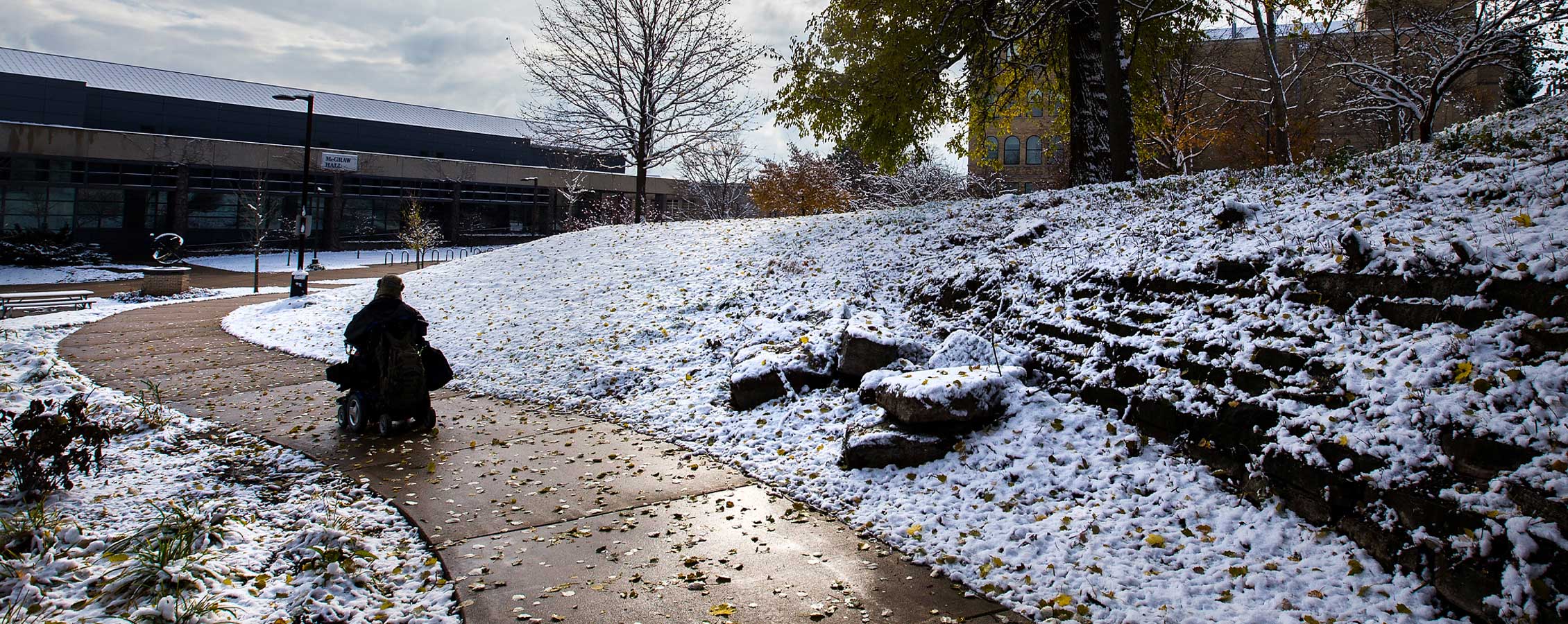UW-Whitewater a top-5 mobility-friendly campus in the nation
January 21, 2021
Written by Craig Schreiner | Photos by Craig Schreiner
It was one of those February days when the crunch of the snow beneath your feet tells you it’s very cold. The temperature might have edged above 10 degrees that day. No love from the weather, but still it was Valentine’s Day. At the Center for Students with Disabilities on the University of Wisconsin-Whitewater campus, Interim Director Debbie Reuter was expecting a visitor — but not the kind who would bring roses.
Mike Ervin, a journalist from New Mobility magazine, was on his way from Chicago to evaluate UW-Whitewater for the magazine’s national survey and ranking of wheelchair-friendly campuses published as Wheels on Campus. Reuter and Student Services Program Manager Amy DiMola had worked to schedule a day’s worth of appointments for the writer.
Ervin isn’t just any writer. He is a wheelchair user, a veteran disabilities reporter, blogger, disability rights activist, and a no-nonsense Chicagoan who was inspired by Sun-Times columnist Mike Royko to take up writing and advocacy.
While UW-Whitewater would eventually be ranked fifth among the top 10 wheelchair-friendly campuses in the nation, and the only Division III college to make the list, this day would not be a free pass.
On the road to Whitewater, Ervin was getting vibrations from his van as well as from the barren snow-covered farm fields beyond Chicago. The “check engine” light began to glow on the dashboard. With nowhere to stop, Ervin and his passenger, a friend he had brought with him, decided to “put the pedal to the metal.”
“He (Ervin) made it here, but his van had broken down,” said Reuter. “We found a local shop, and his friend took it over there. It ended up being a mouse that had eaten through an electrical wire. It was an adventure.”
The adventure set in motion the visible workings of a wheelchair-friendly campus. Ervin said he wanted to visit campus in the dead of winter, the most adverse time for wheelchair users, for the most realistic view and to see how legitimate UW-Whitewater’s commitment to accessibility really was.
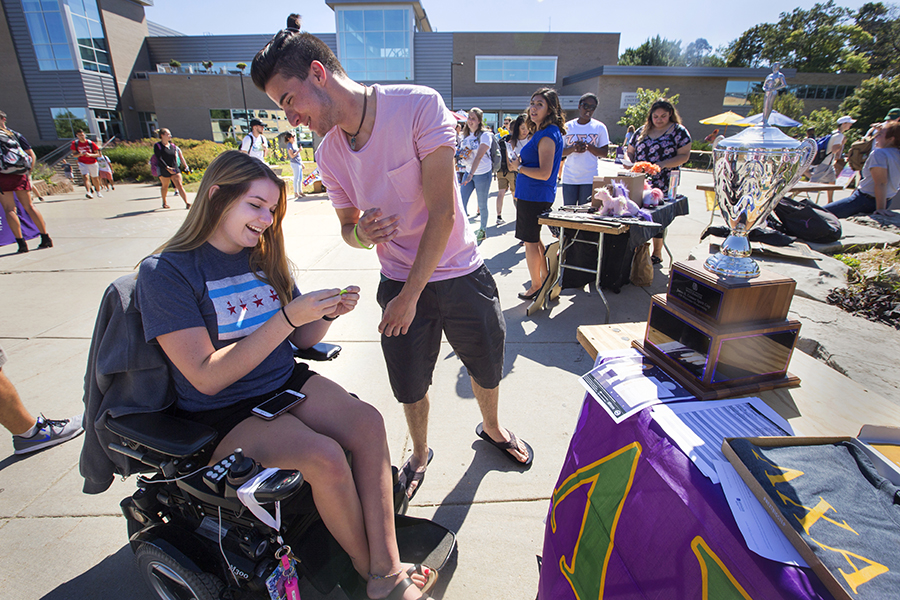
Elementary education major Andres Holm of Lambda Chi Alpha fraternity gives a green paper heart to social work major Madeline Schott of DREAM (Disability Rights, Education, Activism, Mentoring).
With Ervin’s van in the shop, Reuter summoned one of the white Warhawk Wheels vans for the journalist to tour the city and campus. Driving the van was student worker Parker Feely, an occupational safety major from Muskego whom Reuter calls “a key player” for CSD.
“Debbie called Warhawk Wheels, which was good because one of my questions was how do they get around,” said Ervin. “It was very cold and very snowy, and I got the feeling that the experience I had was the experience anyone would have, at least on that particular day.”
Ervin connected with other people to campus who are wheelchair users to hear their perspectives.
Recent alum Lydia Dawley ’19 of Decorah, Iowa, first made the four-hour trip to Whitewater as a high school junior to attend a summer camp on technology for students with communicative disorders. There would be many more trips.
In her Warhawks Rising graduation post last spring, Dawley wrote that her proudest accomplishments were being the first person to go through the communication sciences and disorders program at UW-Whitewater using a communication device, returning to school nine days after her father passed away and getting to show people with disabilities that they can go to college and be independent.
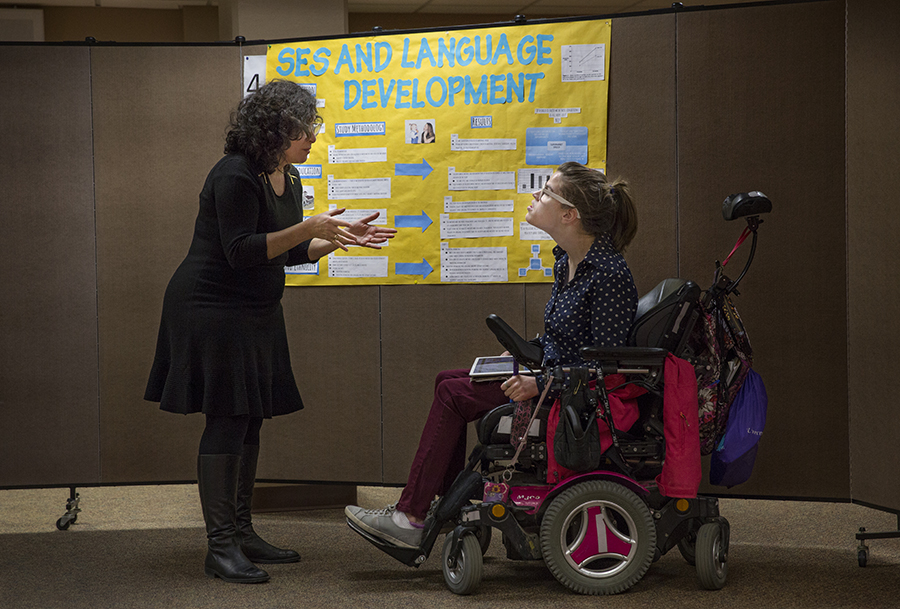
Liberal studies major Lydia Dawley, right, discusses a project completed in the Speech and Language Development in Children course led by Assistant Professor Giuliana Miolo, left. Dawley’s group project studied the impact of socio-economics on language development in children.
Ervin also interviewed two wheelchair basketball Team USA members, John Boie and Lyndsey Zurbrugg, who hope to compete in the upcoming Paralympic Games in Tokyo.
Boie is an alumnus from Milton, Wisconsin, who earned a BBA in human resource management in 2014 and stayed to become an academic advisor and earn an MBA in 2019. He played wheelchair basketball on the Warhawk men’s team.
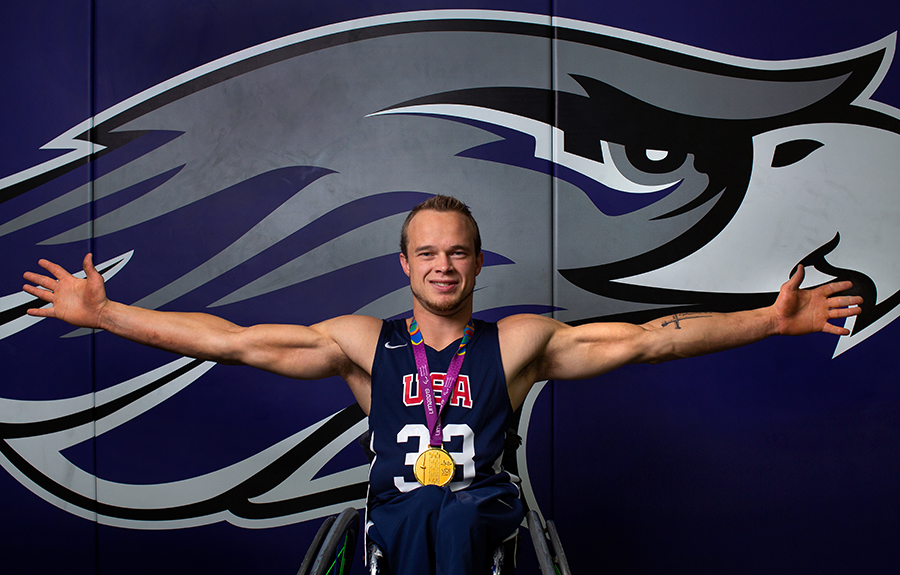
In 2019, John Boie displayed the gold medal he won as a member of Team USA at the Parapan American Games in Lima, Peru, in Roseman Gym, where he practiced as a student with the UW-Whitewater Men's Wheelchair Basketball Team.
Zurbrugg came to UW-Whitewater from the state of Oregon, bypassing larger schools, to study physical education and play basketball. In addition to earning a spot on the Dean’s List seven times, Zurbrugg earned the Sam Welty Memorial Scholarship for wheelchair athletics in 2019
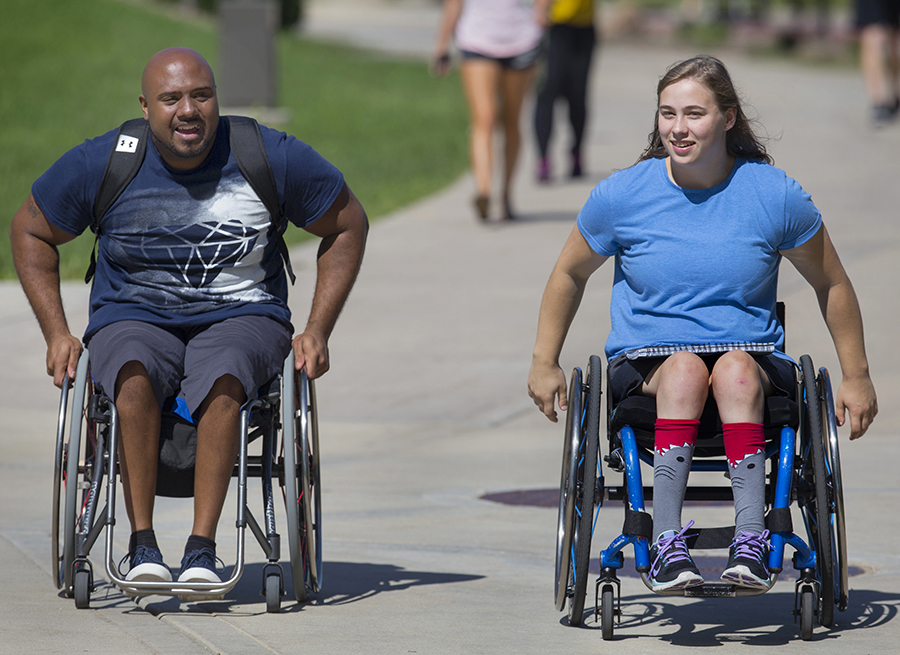
Physical education majors Lindsey Zurbrugg, right, and Christian Seidel talked as they cross the north Wyman Mall on Sept. 4, 2018. Both were members of the men's and women's wheelchair basketball teams, respectively, and Seidel was an international student from Malmo, Sweden.
In Wheels on Campus, Ervin wrote that colleges and universities have steadily improved basic accessibility in the 50 years since the Americans With Disability Act became law. Sixteen of the top 20 schools in the survey could claim all buildings on their campuses could be entered by an independent wheelchair user. Top-tier schools in the survey have made steps toward creating a wheelchair culture on campus by including athletics, access to appropriate physical therapy and even availability of repair facilities. At Whitewater, students living on campus can request any of the residence halls on campus, just like their peers. The accommodations are there.
Ultimately, New Mobility ranked UW-Whitewater fifth among the top 10 wheelchair-friendly campuses in the nation.
“We are delighted that New Mobility is honoring the dedication UW-Whitewater has to our students with disabilities. In 2021, we celebrate the 50th anniversary of our Center for Students with Disabilities. We are proud of our legacy to serve students with a wide range of disabilities, but especially those who use wheelchairs,” Chancellor Dwight C. Watson said. “Our work to improve our accessibility is an ongoing concern. For instance, we are in the process of asking the State of Wisconsin to allow and fund the renovation of Winther Hall. Among the many issues related to that 1970s-era building is that it creates accessibility issues for our students who use wheelchairs. Our commitment to eliminating barriers to access at UW-Whitewater is deep.”
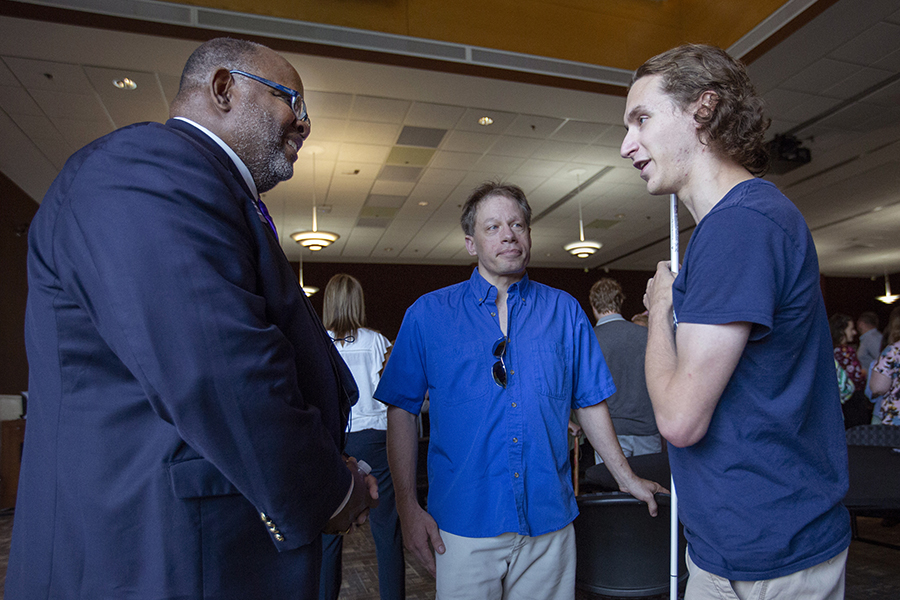
Chris Mathews, right, a journalism major from Cedarburg who has a visual impairment, talked with UW-Whitewater Chancellor Dwight C. Watson, left, and custodian Cory Skaggs, center, on Aug. 5, 2019.
In his assessment, Ervin gave UW-Whitewater high marks for: a compact campus ideal for wheelchairs; transportation on days when it’s not so ideal; buildings designed or modified for access; more than 50 years of experience as a campus with an accessibility mission; athletics, especially a storied wheelchair basketball program; physical therapy services and a workout room with wheelchair accessible exercise equipment; and a good education at a reasonable price. Ervin credited the CSD as a focal point for students and partners across campus.
Along with his observations, Ervin mentioned what he couldn’t see, but was told by the students. The place feels equally like home whether you’re like Boie, who grew up in the next town, or like Zurbrugg, who had never seen the campus before. And when Dawley’s father passed away, her professors and CSD coordinator checked on her, making sure she was on track with her studies — but mostly making sure she was OK.
You can call that a wheelchair-friendly campus. Or maybe just call it a friendly campus.

